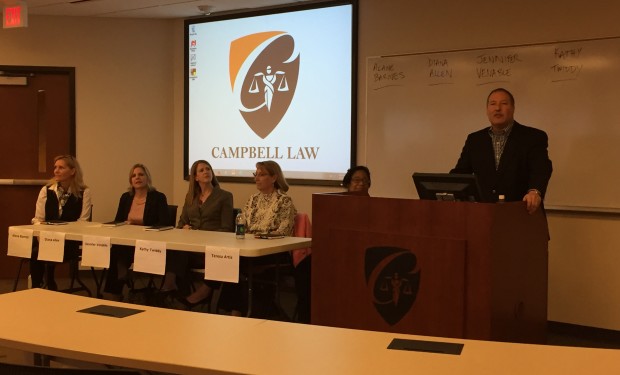Lunch with the Triangle’s Leading Ladies hosted by Campbell Law Women in Law and the Business Law Association
On Wednesday, March 2, 2016, Campbell Law Women in Law and the Campbell Law Business Law Association hosted a lunch with the Triangle’s Leading Ladies. The event was a panel moderated by Ken Hammer, General Counsel of Toshiba, consisting of five women General Counsel in the Raleigh-Durham area: Diana Allen, Channel Adviser General Counsel; Teresa Artis, TransWorld Radio General Counsel; Alane Barnes, BioCryst Pharmaceuticals General Counsel; Kathy Twiddy, Partner at K&L Gates and prior General Counsel for LipoScience, Inc.; and Jennifer Venable, Capitol Broadcasting Company General Counsel.
The focus of the panel was on women in corporate counsel. Ken Hammer asked multiple questions of the panelists such as: What prepared you for working in General Counsel; what’s the most important thing for law students or young attorneys in an interview; what’s your favorite interview question; and what advice can they give?
Prioritizing seemed to be a common quality in preparing yourself for practice, especially in corporate council.
Some excellent advice given by the panelists suggested to the attendees that some of the best qualities are the ability to multi-task, stay calm when things come in that you’re not expecting, but always to expect that “unexpected” things will come at you and enter your day. The ability to manage your time and figure out how to get everything done that you need to get done while understanding you will not have full control of your schedule, but you still have to get your priorities done. Prioritizing seemed to be a common quality in preparing yourself for practice, especially in corporate counsel. It was also suggested to be authentic and develop yourself as a person, because your own ability to perform is just as important to success. Artis suggested to be a problem-solver, not a “know person,” because you’ll be perceived as a person who solves issues, not cleans up messes.
The panelists suggested that it is important to have a teachable spirit, be able to adjust to change, be responsive and answer correspondence timely, even if it’s just acknowledging that you received the correspondence. Authenticity was recognized again by Venable, who stated that everyone has their own experiences, perspective, and that awareness is essential to your ability to contribute to the success of the company. Being helpful and useful was valued by the panelists because it keeps everyone engaged in the business and causes everyone to see what else we can be doing to make the company better.
The panelists suggested that the answer to [an interview] question is less important than delivery.
When asked about their favorite interview questions, the responses were interesting. Hammer’s question was: If you could work anywhere in the world, doing whatever you want to do, wherever you want to do, with whoever you want to do it, what would you be doing? Barnes suggested the question: What made you think this was a good career choice? Allen asks why we are here, because she is looking for an answer about why her company, and it gives the interviewee to show they have done their research.
Venable enjoys asking questions that will highlight your initiative, and that will show your ability to not be “above any work or below any work,” such as: give me a specific example of a time that you had to get someone to do something when they didn’t report to you. Artis likes asking where you want to be in five years, ten years, etc., because she wants to get an understanding of your goals and whether her company is a good fit for the interviewee.
The panelists suggested that the answer to the question is less important than delivery. Sure, the answer is important, but the delivery is also crucial. You want to sell yourself. Twiddy suggested that it is okay to not know the answer because it is more about how you handle imparting the answer than the actual answer itself.
Women should not apologize for every little thing . . .
When asked about what advice they would give, the panelists suggested that women should not apologize for every little thing, be careful to use qualifying language in your writing, and to sell yourself, even though it sounds bad, because being judged based on your work alone won’t cut it. Twiddy suggested for women that it’s okay to be the only woman in the room, and not to even think about it because in this time, it’s a non-issue, or at least it shouldn’t be for you.
When asked about LinkedIn, and how to properly use it, the panelists suggested that while LinkedIn is a great opportunity, you have to be cautious of how you use it. The panelists suggested that it all depends on “context” – the context for the invitation, the context for the message, and the actual message contained. For instance, Allen suggested not to necessarily reach out to an interviewer or another person you are interested in working with on LinkedIn, but to look for the connections you have in common and reach out to those connections. Hammer posed a question that you can connect on LinkedIn, but how will you use LinkedIn – LinkedIn won’t get you a job, you have to do more.
The panelists had excellent answers to the questions and were very responsive to student questions. At the close of the panel, Allen ended with a great point – don’t let rejection get to you too much, and always keep up with marketing yourself. We thank these panelists for coming to Campbell Law and sharing their insight with the students and gusts in attendance. It was an excellent event, and one that hopefully will reoccur in the future.






